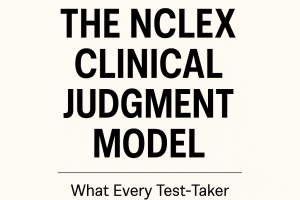Commonly Prescribed Medications and Their Uses: A Guide for NCLEX Exam

Understanding commonly prescribed medications and their uses is essential for nursing students preparing for the NCLEX exam. This knowledge not only helps in passing the exam but also ensures safe and effective patient care in clinical practice. This blog post covers a list of commonly prescribed medications, their uses, and important considerations, along with sample NCLEX questions to enhance your preparation.
1. Metformin (Glucophage)
- Use: Metformin is the first-line medication for managing Type 2 diabetes. It helps control blood sugar levels by decreasing glucose production in the liver and improving insulin sensitivity.
- Important Considerations:
- Monitor renal function, as metformin is contraindicated in patients with renal impairment.
- Instruct patients to take the medication with food to reduce gastrointestinal side effects like nausea and diarrhea.
2. Lisinopril (Prinivil, Zestril)
- Use: Lisinopril is an ACE inhibitor used to treat hypertension (high blood pressure) and heart failure. It can also be prescribed after a heart attack to improve survival.
- Important Considerations:
- Monitor blood pressure regularly.
- Watch for signs of angioedema and hyperkalemia.
- Educate patients about the potential for a persistent dry cough.
3. Atorvastatin (Lipitor)
- Use: Atorvastatin is a statin used to lower cholesterol levels and reduce the risk of cardiovascular disease, including heart attack and stroke.
- Important Considerations:
- Monitor liver function tests, as statins can cause liver damage.
- Advise patients to report any unexplained muscle pain or weakness, which could indicate rhabdomyolysis, a rare but serious side effect.
4. Levothyroxine (Synthroid)
- Use: Levothyroxine is a synthetic thyroid hormone used to treat hypothyroidism. It helps restore normal thyroid hormone levels, improving energy levels and metabolism.
- Important Considerations:
- Administer the medication on an empty stomach, ideally 30 minutes before breakfast.
- Regularly monitor thyroid function tests (TSH levels) to ensure the correct dosage.
- Educate patients about the importance of adherence, as missing doses can lead to symptoms of hypothyroidism.
5. Omeprazole (Prilosec)
- Use: Omeprazole is a proton pump inhibitor (PPI) used to treat gastroesophageal reflux disease (GERD), peptic ulcer disease, and Zollinger-Ellison syndrome. It reduces stomach acid production, allowing ulcers to heal and relieving symptoms of acid reflux.
- Important Considerations:
- Advise patients to take the medication before meals.
- Long-term use may increase the risk of bone fractures, so monitor bone density in at-risk populations.
- Be aware of potential interactions with other medications, such as clopidogrel.
6. Amlodipine (Norvasc)
- Use: Amlodipine is a calcium channel blocker used to treat hypertension and angina (chest pain). It works by relaxing blood vessels, making it easier for the heart to pump blood.
- Important Considerations:
- Monitor blood pressure and heart rate regularly.
- Educate patients about the possibility of peripheral edema (swelling of the ankles or feet).
- Advise patients to avoid grapefruit juice, as it can increase the drug’s levels in the blood.
7. Albuterol (Ventolin, ProAir)
- Use: Albuterol is a short-acting beta-agonist (SABA) used to treat acute asthma attacks and chronic obstructive pulmonary disease (COPD). It works by relaxing the muscles around the airways, making it easier to breathe.
- Important Considerations:
- Instruct patients on the proper use of inhalers or nebulizers.
- Monitor for side effects such as tachycardia, tremors, and nervousness.
- Ensure patients understand the difference between maintenance and rescue inhalers.
8. Warfarin (Coumadin)
- Use: Warfarin is an anticoagulant (blood thinner) used to prevent blood clots in conditions such as atrial fibrillation, deep vein thrombosis (DVT), and pulmonary embolism.
- Important Considerations:
- Monitor INR levels regularly to ensure the medication is within the therapeutic range.
- Educate patients to maintain a consistent intake of vitamin K-rich foods, as vitamin K can reduce the effectiveness of warfarin.
- Warn patients about the increased risk of bleeding and advise them to avoid activities that could result in injury.
9. Gabapentin (Neurontin)
- Use: Gabapentin is used to treat neuropathic pain and as an adjunct therapy for partial seizures. It is also commonly prescribed for conditions like fibromyalgia and restless leg syndrome.
- Important Considerations:
- Monitor for signs of depression or suicidal thoughts, especially in patients with a history of mental health disorders.
- Educate patients about potential side effects, including dizziness, drowsiness, and ataxia (lack of coordination).
- Advise against abrupt discontinuation of the drug to avoid withdrawal symptoms.
10. Furosemide (Lasix)
- Use: Furosemide is a loop diuretic used to treat edema associated with heart failure, liver disease, and kidney disease. It is also used to manage hypertension.
- Important Considerations:
- Monitor electrolyte levels, particularly potassium, as furosemide can cause hypokalemia (low potassium levels).
- Advise patients to take the medication in the morning to avoid nocturia (frequent urination at night).
- Educate patients to monitor their weight daily to track fluid retention.
Sample NCLEX Questions
Question 1
A patient is prescribed metformin for Type 2 diabetes. Which of the following should the nurse monitor closely?
A. Liver function
B. Blood pressure
C. Renal function
D. Heart rate
Answer: C. Renal function
Question 2
A patient on warfarin therapy should avoid which of the following foods?
A. Oranges
B. Spinach
C. Chicken
D. Milk
Answer: B. Spinach
Question 3
A nurse is educating a patient on the use of albuterol. Which statement indicates the patient understands the use of this medication?
A. “I will use this inhaler daily to prevent asthma attacks.”
B. “I will use this inhaler only when I have difficulty breathing.”
C. “I will take this inhaler on an empty stomach.”
D. “I will avoid using this inhaler before exercise.”
Answer: B. “I will use this inhaler only when I have difficulty breathing.”
Question 4
Which of the following is a priority for a nurse to monitor in a patient taking furosemide?
A. Heart rate
B. Serum potassium
C. Blood glucose
D. Respiratory rate
Answer: B. Serum potassium
NCLEX Preparation Tips for Commonly Prescribed Medications
- Know the Mechanism of Action: Understanding how each medication works will help you answer questions related to drug effects and interactions.
- Memorize Key Side Effects: Focus on the most common and severe side effects, especially those that require immediate nursing intervention.
- Practice Questions: Regularly practice NCLEX-style questions on pharmacology to reinforce your knowledge.
- Stay Updated: Medications and guidelines can change, so stay informed about the latest drug information.
Conclusion
A solid understanding of commonly prescribed medications and their uses is crucial for success on the NCLEX exam and in clinical practice. By familiarizing yourself with these drugs, their effects, and how to manage them, you can provide safe and effective care to your patients. Keep studying, practice regularly, and apply your knowledge to excel in your nursing career.






